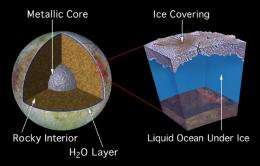Jupiter's Moon Europa Has Enough Oxygen For Life

New research suggests that there is plenty of oxygen available in the subsurface ocean of Europa to support oxygen-based metabolic processes for life similar to that on Earth. In fact, there may be enough oxygen to support complex, animal-like organisms with greater oxygen demands than microorganisms.
The global ocean on Jupiter’s moon Europa contains about twice the liquid water of all the Earth’s oceans combined. New research suggests that there may be plenty of oxygen available in that ocean to support life, a hundred times more oxygen than previously estimated.
The chances for life there have been uncertain, because Europa’s ocean lies beneath several miles of ice, which separates it from the production of oxygen at the surface by energetic charged particles (similar to cosmic rays). Without oxygen, life could conceivably exist at hot springs in the ocean floor using exotic metabolic chemistries, based on sulfur or the production of methane. However, it is not certain whether the ocean floor actually would provide the conditions for such life.
Therefore a key question has been whether enough oxygen reaches the ocean to support the oxygen-based metabolic process that is most familiar to us. An answer comes from considering the young age of Europa’s surface. Its geology and the paucity of impact craters suggests that the top of the ice is continually reformed such that the current surface is only about 50 million years old, roughly 1% of the age of the solar system.
Richard Greenberg of the University of Arizona has considered three generic resurfacing processes: gradually laying fresh material on the surface; opening cracks which fill with fresh ice from below; and disrupting patches of surface in place and replacing them with fresh material. Using estimates for the production of oxidizers at the surface, he finds that the delivery rate into the ocean is so fast that the oxygen concentration could exceed that of the Earth’s oceans in only a few million years. Greenberg presented his findings at the 41st meeting of the American Astronomical Society’s Division for Planetary Sciences now under way in Fajardo, Puerto Rico.
Greenberg says that the concentrations of oxygen would be great enough to support not only microorganisms, but also “macrofauna”, that is, more complex animal-like organisms which have greater oxygen demands. The continual supply of oxygen could support roughly 3 billion kilograms of macrofauna, assuming similar oxygen demands to terrestrial fish.
The good news for the question of the origin of life is that there would be a delay of a couple of billion years before the first surface oxygen reached the ocean. Without that delay, the first pre-biotic chemistry and the first primitive organic structures would be disrupted by oxidation. Oxidation is a hazard unless organisms have evolved protection from its damaging effects. A similar delay in the production of oxygen on Earth was probably essential for allowing life to get started here.
Richard Greenberg is the author of the recent book “Unmasking Europa: The Search for Life on Jupiter’s Ocean Moon”, which offers a comprehensive picture of Europa for the general reader.
• Join PhysOrg.com on Facebook!
• Follow PhysOrg.com on Twitter!
Source: American Astronomical Society, via Astrobio.
















